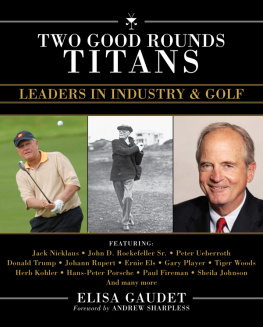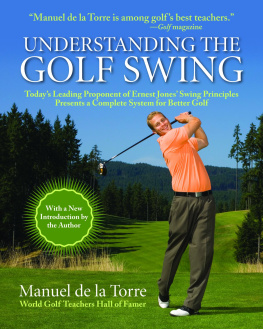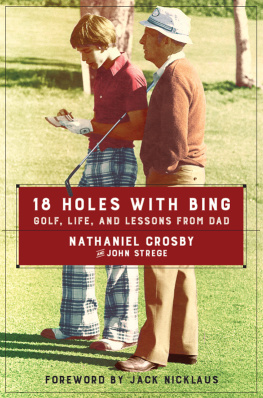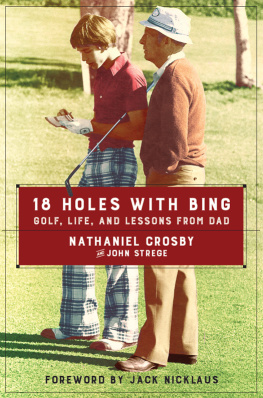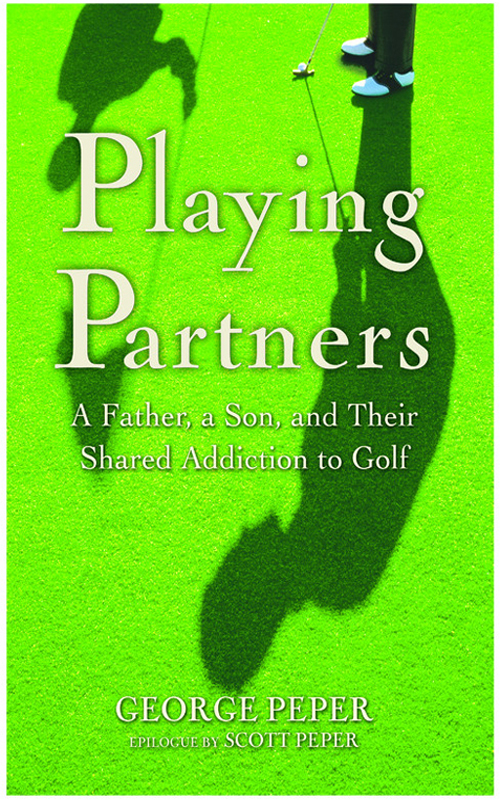Copyright 2003 by George Peper
Epilogue copyright 2003 by Scott Peper
All rights reserved.
Warner Books, Inc.
Hachette Book Group
237 Park Avenue
New York, NY 10017
Visit our website at www.HachetteBookGroup.com.
First eBook Edition: May 2003
ISBN: 978-0-7595-2799-7
To Libby, my one true partner,
with love on our twenty-fifth
M y fathers name was Gerhard.
Now, imagine growing up in a middle-class New York suburb, just after World War II, with a father named Gerhard. I still shudder over that day in second grade when, in a primitive stab at ethnic profiling, Mrs. Sanford strolled the room asking each of us to recite the names of our parents.
Shirley and Bill, Mary and Bob, Eileen and Lester, chirped my homogeneous classmates at the William Street Elementary School. Then she reached my desk.
Doris and Gerhard, I mumbled quickly.
Doris and what?
Gerhard.
Ah, Gerhard thats a good German name, she said, serving two dozen eight-year-olds their first oxymoron.
At recess later that day my direst fears were realized when Dicky Smyers planted an accusative finger in my chest and said, Your dads a Nazi.
Well, my father was emphatically not a heel-clicker. That said, he was about as American as apple strudel. Born in a small town in Schleswig-Holstein in 1903, he left home at age nineteen, hopping a steamship from Bremerhaven to New York in search of his fortune. At Ellis Island, when he reached the front of the line, they asked him his name.
Gerhard Peper, he said, pronouncing it as if it were a producer of pulp products.
No way, pal, said the immigration clerk. Over here, with a name spelled like that, no ones gonna call you Paper. Its either Gerry Peeper or Gerry Pepper, take your pick.
Dad opted for the marginally more euphonious Pepper. However, he declined sprightly Gerry, gutting it out in the New World with darkly thudding Gerhard. In one way this turned out to be a canny move. By 1940 Americans would be vilifying every soldier in Hitlers army as a Gerry.
By that time my father was a card-carrying American. Had he fought in that war, he would have fought for the United Statesagainst his own brotherbut he was too old to serve. Ten years later, when I arrived, he was, again, too old to serveas my father. At age forty-six he could have been my grandfather.
Old and old school he was, a man who worked ten hours a day, six days a week his entire adult life. Fresh off the boat, hed signed on as a carpenters assistant, hoping to raise enough money to put himself through medical school. But economic reality forced him to abandon that plan in favor of a more affordable alternativechiropractic collegemoonlighting as a busboy during four years of schooling in Iowa.
A week before graduation he threw a dart at the U.S. map and speared Pearl River, New York, The Town of Friendly People, a tiny hamlet twenty miles north of Manhattan. In 1933 it was there that he set up a two-room office.
One of his first patients was my mother. She was eleven years younger than he, a sophomore at Mount Holyoke College. Her major was German, and she had plenty in common with Dad, beginning with Teutonic blood on both sides of her family. In fact, during the nineteenth century her maternal grandparents had emigrated to the United States with the most astonishing of surnames: Peper. Yes, one-p-in-the-middle Pepers dangle from virtually every branch of my family tree. Im not sure whether that makes me a hybrid or a mutation. I do know Im the product of a union that somehow lasted forty-three years before my mothers death in 1977.
Although stern and humorless on the surface, my father had a sort of oompah-band schmaltz that endeared him to just about everyone, beginning with Mom. He called her Toots (the truth is, he called all women Toots, but Mom was Toots #1); he hugged and kissed her openly and often and constantly proclaimed her the star of my sleepless nights.
In a similar way he schmoozed his female patients, who unfailingly fell for his little-old-winemaker charm. Although Dad claimed to hate socializingand people in generalhe was invariably the life of the party. He had a fine, strong singing voice, could waltz like Astaire, and spoke five languages fluently, albeit with a heavy German accent.
A classic family story involves the lady of a certain age whose chiropractic treatment required spinal and cranial X rays.
Okay, Toots, said Dad as he fired up his machine, are you wearing any bridges? (False teeth apparently inhibit a clear view of the medulla and environs.)
Yes, of course, she said.
Then Im afraid youll have to remove them, he said, directing her to the lavatory.
Moments later the woman reappeared, stark naked from the waist down. Bridges, as pronounced by Dad, had registered as britches.
Language barrier aside, he was a terrific chiropractor. Although most of his patients came in search of relief from lower-back pain, he had success helping people with everything from epilepsy to multiple sclerosis. But he also knew his limits, frequently recommending patients to local physicians who in turn referred their sacroiliac sufferers his way. In a profession that has provoked unending skepticism Dad was legit: honest, caring, dedicated, and thorough.
Personally, I never understood the whole chiropractic shtick. How manipulating a section of the neck or spine could possibly repair any internal malady was beyond me. My father once told me it was like turning on a light. You flip a switch on the wall, he said, and up on the ceiling a bulb goes on. Thats what I do with the spinal cord. Kind of scary, if you ask me. I can attest, however, that throughout my twelve years of public school, I missed only a handful of days, largely due to Dads knack of squelching colds and related ailments by means of a quick adjustment.
Since his office was attached to our house, members of the immediate family could be whisked in for checkups and routine servicing. Every examination was a two-part process. Hed begin by gliding a strange two-pronged instrumentsort of a pregnant magnetup the back of ones neck. This produced a red-ink readout resembling a six-month chart of the Nasdaq. After a perusual of its peaks and valleys he moved to part two, which involved one of two ominous machines, known privately by me as Godzilla and the Rack.
Godzilla was comprised of four or five spring-loaded leather cushions. It was powered by a groaning electric engine and angled up and down like a construction crane when my father stepped on a pedal at its base. In its at-rest position Godzilla inclined about twenty degrees below vertical. The patient boarded it, facedown in the firm cleavage of its paper-covered pillows. Then Dad hit the gas and down it steamed until parallel to the flooradjustment mode.
The Rack was more low-techa rigid Naugahyde chaise lounge on which the patient assumed a more or less fetal position. The Racks only distinctive feature was a raised headrest with a small cavity into which one inserted the ear of Dads choice.
Once I was in position on either apparatus, Dad would cradle my head in his huge hands, sliding soft, puffy fingers ominously across my neck, temples, cheeks, and jaw as he searched for the perfect time and place to make his move. This unsettling foreplay could last anywhere from five to thirty seconds, depending on how quickly he found his inspiration. Then, with the suddenness of a lightning bolt, hed snap his hands, usually causing an audible click inside my neck. Adjustment completed.
Now lie still for a couple of minutes, hed say as my eyeballs returned to their sockets. Invariably, Id fall fast asleep. By the next morning my earache, runny nose, sore throat, and/or cough was miraculously gone. These days, as I address my computerthree Aleves in my stomach and a back pillow at the base of my chairIm aching for one of those adjustments.



